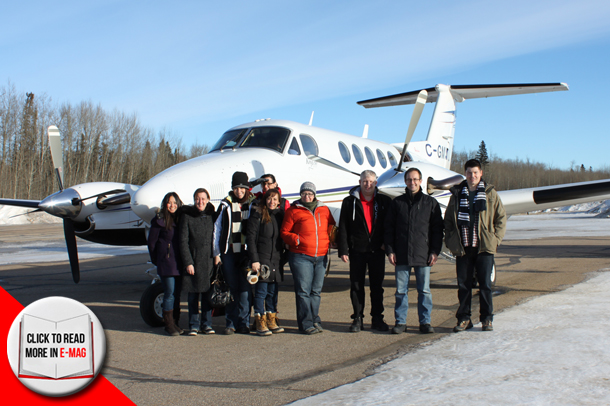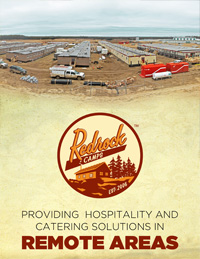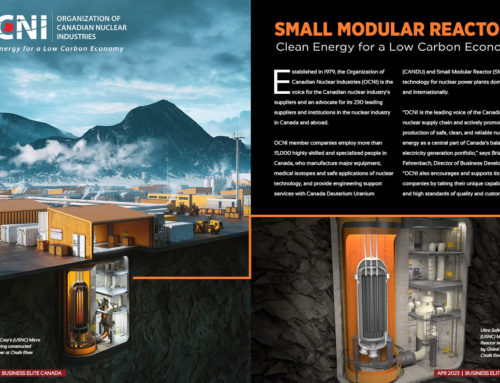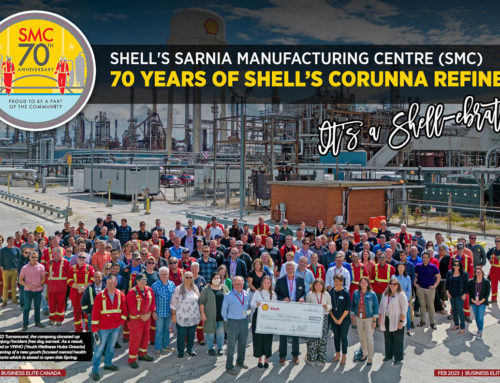By Leah Kellar
Redrock Camps was named #1 out of Alberta’s top 50 Fastest Growth (Alberta Venture magazine) companies, increasing in size by 113 per cent every year for the past 3 years. It could be said that President and CEO, Troy Ferguson, quite literally planted the foundation for Redrock’s success. Ferguson started out from the ground up as a tree planter working across Ontario, B.C, and Alberta for 17 years prior to starting the company in 2006. Redrock, only in its eighth year, has seen tremendous growth starting with an employee base of about 10 in late 2006 and closing this year at a peak of 430 employees with $43.6-million in revenues reported last year. “We’ve had exponential growth since we got going. We’ve had financial stability come on our side, which is great when you’re trying to build a business,” Ferguson told Business Elite Canada in a recent interview.
Redrock is a privately owned Canadian company headquartered in Calgary, Alberta with operational facilities located in Grande Prairie and Edmonton. It is a uniquely full turnkey camp providing complete hospitality and catering solutions to the workforce of companies in the oil and gas industries often located in the most Northerly and remote areas of Canada.
“Tree planting really is remote logistics, it’s remote hospitality, its taking care of people in the middle of nowhere. It’s all about marching an army in a certain direction and getting things done,” says Ferguson. He recognized a demand in the market place for remote hospitality services in the early 2000s when there was huge shortage of service providers in labour. Eager to grab the opportunity to fill the void, and certainly qualified with years of experience in the remote logistics required in the tree planting business, Ferguson rented a drill camp, and soon thereafter started Redrock.
Being a full-fledged turnkey business in the oil and gas industry means that Redrock has an excess of “huge career opportunities.” Ferguson confirms the company has been on a hiring spree for years.
“We do it all,” You can hear the pride in his voice, and his own motivation to keep workers motivated when working in remote Northerly and naturally un-hospitable locations. Hospitality is at the heart of his company. “Remote hospitality is our number one service. And that’s pretty much camp management, catering, housekeeping, and logistics, and then secondly, the camp infrastructure and the camp equipment. Around that we have the delivery of it, so getting it out to sites, and some of these sites can be ocean-accessed only, some can be accessed by ice-road truckers, or by gravel road, and then we have the construction on site of the camp. The assembly of it is like putting all the pieces of Lego together,” he says. “Those are our two things: camp and catering.”
Seems simple enough, but it is a well-honed strategic system in camp management, catering, housekeeping and the logistics that is served by supply chain management—like a well-managed hotel, the only catch is that it’s in the middle of nowhere.
“Out here we’re really good at doing things way out in the middle of nowhere with Mother Nature trying to get us all of the time,” says Ferguson. Some of those projects requiring the fortitude and know-how involved in delivering quality remote hospitality and camp infrastructure was the design and manufacturing of a research station on the Northern tip of Labrador located on the park boundary of Torngat Mountains National Park. This major project was required by a combination of groups including the Nunavut Territorial Inuit government, Parks Canada, and Arctic Research Canada.
“We took a traditional small little drill camp that’s very mobile and built like a brick house, and we took that design and made it work for them. They could only get there by air or by ocean. It took us two summers to install it. We had to wait for the icebergs to clear and we shipped everything out of piers and barges,” says Ferguson. WWII landing craft were even used in the making of this camp. The company had to start from scratch and build its own site enlisting the help of local Inuit to assemble the camp whom also benefited by the experience gaining valuable training and knowledge.
Also, hydroelectric ocean access work is another specialty of the company. This includes run-of-the-river projects. “We did one on the west coast, the Sechelt area, and that was pretty cool because you can’t drive there. So everything was done in the ocean and up on the side of a mountain. So the logistics, the construction, the community involvement, leaning on what people knew in the local area—that was huge for us. That was really fun,” says Ferguson. In terms of challenges over the years, Redrock has implemented a winning business solution that highlights the importance of sustaining human capital, and that to him encompasses hospitality for employees in the very fabric and operation of the camps.
“It’s all about sustaining human capital and there aren’t enough humans in terms of the forecasting of things to be done out here. So we’re trying to provide solutions for companies that once they look at our equipment they’ll go, “Wow, this is awesome!” And we think that we’ll be able to retain the people who are going to do the work for us and help us finish these projects on time and on budget.”
According to Troy, at Redrock, “the relationships we’ve developed with companies like A-R Partners for our accounting foundation, Britco Structures to manufacture our high-end camps, the Bank of Montreal for helping understand our financial environment, Results Canada execution coaching guidance, and legal brilliance by McCarthy Tétrault LLP has been very influential and inspiring. As we navigate the complexities of brisk growth, I’ve discovered that supplier partnerships that are aligned with our Core Values give us strength and diversity to win. From realistic practices to stable strategy advice behind the scenes, Redrock’s key suppliers have helped a couple of small-town entrepreneur’s focus on the heart of the business through leadership, people engagement and service delivery.”
And to that end Ferguson stresses the mutual benefit of partnerships with local aboriginals and First Nations in the area. “We believe in sharing with First Nations for mutual benefit and with Métis associations as well. It’s highly significant to be able to create some capacity on these reserves. I think it is a long journey, but it is one that is ready to happen and I think the people in these communities have embraced the opportunities that are knocking on their door. The First Nations communities just don’t want jobs, they would like to have some key learnings and some abilities to do things on their own. I think we’re here to help them benefit as well as ourselves from a business perspective, but also to teach them what we do and hopefully someday they won’t need us anymore and they’ll hire us, which would be pretty exciting.”
Redrock also actively provides hospitality at the family level to its employees through contributions to community programs such as the Two Wheel View Program. “One of their objectives is to transform kids lives from the seat of a bike. So we sponsor their “Earn a Bike” program. These kids all across Calgary learn about community stewardship and social responsibility, as well as getting to go and build their bikes. They’re all donated bikes, and at the end of it they earn their bikes,” says Ferguson. “They get to pick a bike. We bought all of the helmets and locks for them. We go to the graduation ceremonies. That makes us feel pretty good because these kids, there might not be any of them whose parents work in the oil patches, but if we can help one of them…that mother or dad can be a little bit more at ease reducing the stress of parenting from afar.”
Secondly, Redrock works with Calgary Reads, which is a reading program for kids. Ferguson has three children of his own and one who had a bit of a tough time with reading, and had to get a little extra help on the side. “It showed me how important and how successful it can be and so we sponsored our time with Calgary reads. Where our people in Calgary can go and help out kids reading. Usually around Grade 1 and Grade 2 is the sweet spot. Anything we can do to reduce the stress of parenting,” says Ferguson.
And what lies ahead for Redrock on its upward climb? Ferguson lists an (Enterprise Resource Plan) ERP at the top of the list, which will tie all of the parts of the business together, a SAP business one to help build a solid foundation for growth. “It’s like a movie theatre, you’ve got the show that’s going on in front of the curtain out on the stage and that’s our operations out in the field and it’s everything we do day to day.” The ERP is what’s behind the curtain of Redrock and its next strategic move.
“It’s been our big bold move here in the past twelve months. It takes a lot of time, a lot of energy and a lot of people to get it done. Once it’s complete this summer it will really help us to take on substantial business growth. And in the long term, I’d like to see our business get to about $250-million in revenue in the next five years. That would be pretty exciting for us.”







